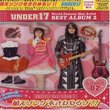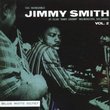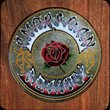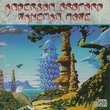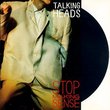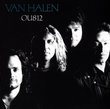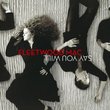| All Artists: Yes Title: Union Members Wishing: 0 Total Copies: 0 Label: Arista Original Release Date: 4/30/1991 Release Date: 4/30/1991 Genres: International Music, Pop, Rock, Classic Rock Styles: Europe, Britain & Ireland, Progressive, Progressive Rock, Psychedelic Rock, Album-Oriented Rock (AOR), Arena Rock Number of Discs: 1 SwapaCD Credits: 1 UPC: 078221864329 |
Search - Yes :: Union
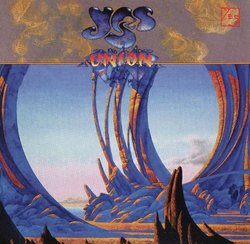 | Yes Union Genres: International Music, Pop, Rock, Classic Rock
Japanese only SHM-CD (Super High Material CD - playable on all CD players) pressing. BMG. 2008. |
Larger Image |
CD DetailsSynopsis
Album Description Japanese only SHM-CD (Super High Material CD - playable on all CD players) pressing. BMG. 2008. Similar CDsSimilarly Requested CDs
|
Member CD ReviewsReviewed on 3/19/2010... One of my favorites by Yes. Lift Me Up, The Miracle of Life, I Would Have Waited Forever and Take the Water to the Mountain are particularly favorite tracks. Seems like they were able to deliver their messages w/o breaking the traditional 3-5 min frames that songs are virtually required to fall into these days. 2 of 2 member(s) found this review helpful.
CD ReviewsSolid effort Joker | Michigan | 02/14/2010 (4 out of 5 stars) "Jon Anderson (vocals), Bill Bruford (drums), Steve Howe (guitar), Tony Kaye (keyboards), Trevor Rabin (guitar), Chris Squire (bass), Rick Wakeman (keyboards), and Alan White (drums) team up for a "union" of many current and former Yes members. The result is this solid album "Union". I had the good fortune of seeing Yes in concert during their Union tour in 1991. It was really unique seeing two drummers on the stage playing at the same time and seeing a total of eight guys on stage. It remains to this day one of the best concerts I've ever been to. And LOUD. Now about this album... The top tracks in my opinion are I Would Have Waited Forever, Shock To The System (my personal favorite), Lift Me Up, and Saving My Heart. This album has a lot of radio-friendly songs that I consider hits and may have been hits, such as the above-mentioned songs. This album also contains a lot of moody and unique and sort of bizarre sounding songs that are very good. This was a great comeback album for Yes. If you're into the newer Yes (the Yes material that consists of mostly standard-length songs rather than epic-length songs), then you will probably like this album. Myself, I'm a fan of both their "progressive" years with epic-length songs as well as their shorter standard-length material. I highly recommend this album." Mispackaged, but... ABWH II + Mike Sobocinski | Lansing, MI | 07/15/2009 (4 out of 5 stars) "This disc must be acknowledged to be an awkward mixture. It is titled "Union" and on the back, it lists all the most prominent band members of Yes from the 1970s and 1980s, but it's not what it might have appeared to be at first. Rather than an actual "union," it's essentially a second album from ABWH (Anderson Bruford Wakeman Howe), plus 4 tracks from the bands 1980s Trevor Rabin lineup.
Unfortunately, these two bands have had their separately written and produced work shuffled together on this disc, and only with familiarity and a study of the liner notes can the actual nature of the disc (and its merits) be sorted through. This review, then, presents my current view of the disc, that allows me to best enjoy it and fit it in with the Yes chronology. Useful background: The 1980s lineup consisted of Jon Anderson and Trevor Rabin as key vocalists (controversial, in that Anderson always had a more distinctive and unusual softer falsetto sound that had always been characteristic of the band, with Rabin's sound fairly typical of many other bands), Trevor Rabin on guitars, Chris Squire on bass, Alan White on drums, and Tony Kaye on keyboards. This band produced two initial albums: 1983's "90125" and 1987's "Big Generator" - unfortunately the 4 years between them made it more difficult for fan momentum from the successful "90125" album to be sustained. Another reshuffling of the band membership took place in 1989, but without Chris Squire, could not be called "Yes" and so among fans, the lineup is known as ABWH, after the name of their initial release "Anderson Bruford Wakeman Howe." The "Union" album contains 9 tracks by ABWH (Tony Levin plays bass in these tracks, as he had on ABWH, although Chris Squire did contribute usefully to the vocal harmonies), which might be called ABWH II, and these 42 minutes contain a lot of strong material, for those who don't mind that Bruford's percussion includes programmed sounds, or that there was a lot of engineering behind the sound of these tracks. I find that the effects of these two aspects of ABWH II make for an excitingly fresh sound. The 1989 ABWH album was weakened, in my opinion, by sections that sounded repetitive (the ending of the Order of the Universe) or too strung-together (on the principle that longer songs may be considered automatically better by progressive rock fans). In the case of ABWH II, contained in this 1991 disc, however, the songs are all kept very tight, and never outlast the interest of their musical ideas. In addition, the audio engineering provides a lushly dense layering of sounds, and some very exciting montages especially with the voices and percussion. Tracks 1, 2, 5, 8, 11, and 12 are in this style - "I Would Have Waited Forever" and "Shock to the System" and contain great classic Yes singing, innovative syncopations in the percussion, and characteristic guitar licks and countermelodies by Howe. These tracks are only 30 minutes long, however, and there are 3 lighter, softer tracks added in to round out the ABWH II album here. One is a Howe guitar solo (as was done on 1971's "The Yes Album" except that this is a studio recording instead of live, and is not as fast and exciting), which constitutes track 3 ("Masquerade"), and tracks 10 and 13-14 are two quiet, atmospheric, New-Age styled works that will seem quite soft and mellow to most rock listeners, but are of good quality and a benefit to the album if its order of play is suitably reprogrammed to avoid too evident a clash of musical and playing styles (which is the Union album's primary problem). I consider the ABWH II tracks to be a stronger "album" than the original 1989 ABWH work - being much more dense in conception and execution, although this describes only 30 minutes of "Union," whereas 1989's ABWH album was twice as long. There's probably enough said on that. If you enjoyed ABWH or want to hear Bruford and Howe and a more classic Yes sound, buy this album for the key 30 minutes of these tracks, and program your CD player to run tracks 1, 2, 3, 5, 8, 10, 11, 12, and 13-14. You should be very pleased indeed, once you get used to the songs. 4 stars out of 5 for ABWH II. Now, the real challenge... Programmed between this strong ABWH II album, the "Union" disc also contains 4 tracks from the 1980s Trevor Rabin lineup. In all fairness, these would be decent enough songs if released by another band, but as everyone reading this review probably knows, Yes has done so much phenomenal music over the decades that the standards for the band's albums are very high. Extremely high. The problem with the Rabin-dominated albums has always been their inclusion of a few songs that have a standard format and an insufficient number of innovative ideas to maintain the expected Yes standard for innovation, excitement, etc. On 90125, these "standard" formats dominated its' first half ("Hold On," "It Can Happen," and "Changes") and it was mainly the second half of the album that excelled (the opening track "Owner of a Lonely Heart" being of sufficient brevity and interest in its engineering to have earned Yes its only #1 hit, and thus I for one have nothing to complain about there except the amount that it's been overplayed at the expense of the innumerable other Yes songs of higher quality, interest, and innovation.) On Big Generator, some of the tracks ("I'm Running") contain great moments but were apparently designed to be part of a giant 20-minute suite, but were awkwardly split up as separate songs and then shuffled among the standard-format songs Rabin songs like "Rhythm of Love" and "Love Will Find A Way," and even the longer track that remained ("Shoot High Aim Low") was highly repetitive and operated mainly on a hypnotic level rather than through dense composition. Rabin's guitar style has always been a more traditional rock sound, with rhythmic licks and then a solo in the 3rd quarter of the song, rather than Howe's impressive countermelodies and amazing innovations and compositional boldness. Those who enjoy Rabin will enjoy the 3 Rabin songs here (tracks 4, 6, and 7), but as with the Rabin songs on the 1983 and 1987 albums they don't really sound like Yes. They're rather repetitive in their strophic format, and although the quality of the musicians' playing is very fine, the composition of the songs just isn't that interesting. So these tracks work more on a hypnotic repetitive mode, in which little keyboard garnishes have been added just to keep things from being totally predictable, or there's some shifting in White's drumwork just to keep things from being totally predictable, or there's a guitar lick from Rabin just to keep things from being totally predictable. It works well enough by the standards of conventional rock, but it's really not exceptional stuff. It's not at the highest standards of innovation that Yes listeners crave! Thus, tracks 4, 6, and 7 are essentially standard 5 minute Rabin songs, with some extra sections as intro or coda to add an extra couple minutes of running time onto tracks 4 and 7 (which, at 7:30, turns out to be the longest track on the album... not that it's anywhere near as impressive as Silent Talking or other ABWH tracks that are hardly more than half its length, because the sound of Rabin's works has always been more repetitive and more "standard" and less dense and less innovative). Being essentially standard quality rock-pop songs, I'd give them a standard 3 star rating out of 4. They're the type of thing that sound enjoyable, though not thrilling, and that people would listen to primarily to convey the lyrics, rather than for the music composition itself to do much. And where the music doesn't bother to shift and be customized to match the lyrics, but it's all in standard strophic form where each stanza is given the same melodies, no matter what the lyrics are about, with a refrain in between each stanza that generally feels like it's been repeated several times more than it needed to be by the time the song ends. Seasoned Yes listeners are usually too sophisticated to need or prefer such extraneous repetitions, which were designed primarily for 80s radio play in case anyone was wondering what the name of the song was, and thus can hear it again and again. (Yawn!) Okay, so the Rabin tracks are unexceptional but can't actually in fairness be called bad. But their style is certainly different and much more mundane than the ABWH tracks. One needs to get back in the mood of the repetitive, hypnotic style of standard pop-rock tracks such as Rabin's, and so these tracks are best heard in separation from the ABWH II tracks, such as just before going on to listen to the (more ambitious and meritorious) 1994 "Talk" album by the same line-up of the band (and which again contained an utterly mediocre, though solidly performed, song called "Walls" to bring it down from the high standards of innovation and dynamic excitement that Yes listeners crave). A fourth track in the AWKRS lineup is actually the most interesting and effective of the non-ABWH tracks - it's track #9 on Union, and is hypnotic and repetitive but in a slow, New-Age, well-engineered fashion that has a very nice sound to it and a bit of denseness in its texture. So that's a good track. Again, I won't exaggerate and say that the Rabin tracks are actually inferior by the standards of rock music - they certainly are not. They can only be considered "inferior" in comparison to the extremely high standards of Yes music. So enjoy them as much as you like and can, and I'm happy for you, because I do the same thing... but as a prelude to listening to the 1994 "Talk" album. They're just not at the level of the ABWH tracks, though, and drag down the listening experience unless you reprogram your player to avoid the clash of styles. In isolation, they're enjoyable, although limited in their ambitions and accomplishments. 3 stars out of 5. There is a huge number of other bands who can also play "standard" songs very well, and sound nice while doing so. But the vast majority of Yes' work is much more innovative and exciting and dense and better-composed than was heard in 1980s-90s lineups. The ABWH II tracks on this album is quite probably the most interesting stuff that the band made during period through the entire decade of the 1980s until they finally reassembled one of their classic 1970s lineups for the 1995-6 Keys to Ascension studio tracks ("Be The One," "Footprints," etc.) So for those who are Yes completists, if you buy anything from the 1983-1994 period, you have to include the ABWH tracks from this album!! Otherwise, there are probably a lot of Yes listeners who are content to listen to the up through 1980, skip over the Rabin era entirely, and resume with the newer albums from 1995 onward." |

 Track Listings (14) - Disc #1
Track Listings (14) - Disc #1
